Can an airline walk away from a tragedy by invoking international payment caps? Not this time.
Ontario’s Superior Court just delivered a crushing blow to Ukraine International Airlines, upholding a ruling that strips the carrier of its right to limit compensation for the 176 people killed when flight PS752 was shot down over Tehran, Iran, in 2020.
The court’s reasoning? UIA acted negligently because it “failed to assess the risks associated with operating flights from Tehran.” That single finding changes everything for the families seeking justice.
Here’s why this matters. Under international aviation law, airlines typically pay up to $180,000 per passenger when fault is proven. But when negligence enters the picture? Those caps disappear.
This determination allows victims’ families to seek compensation beyond the standard international aviation limits.
The Ontario Court of Appeal wasn’t buying UIA’s challenge either. “I dismiss the appeal, ordering court costs to be paid by the appellant in favor of the defendants,” the court stated.
What actually happened that January morning?
January 8, 2020. Tehran’s airport. A Boeing 737-800 climbs into the dawn sky carrying 176 people on board—11 Ukrainians, plus citizens from Iran, Canada, Britain and Afghanistan, all of them died.
Minutes later, Iranian forces shoot it down.
Why? They mistook the civilian aircraft for a hostile military target. Iran initially denied responsibility, then admitted what officials called a “catastrophic mistake” three days later.
The timing tells the story. Hours earlier, Iran had launched missile strikes on US military bases in Iraq, retaliating for the assassination of Iranian general Qasem Soleimani. Tensions were sky-high.
Could this have been prevented?
That’s the million-dollar question the Canadian court answered with a resounding yes.
French investigators decoded both flight recorders in July 2020. The data confirmed what Ukraine suspected: the aircraft was functioning normally when the missile struck. No mechanical failure. No pilot error.
The plane was fine. The decision to fly wasn’t.
Why is Iran’s investigation controversial?
The Iranian probe has drawn fire from multiple countries. In February 2021, UN special rapporteurs accused Iran of violating international law and conducting a non-transparent investigation riddled with “inaccuracies.”
Ukraine joined that criticism. So did other affected nations.
Iran did sentence 10 military personnel in April, according to reports. But details? Those remain classified.
What happens now?
UIA can no longer hide behind international treaty provisions that would have capped compensation payments. The airline faces potentially massive financial exposure.
For the families, this ruling represents more than money. It’s acknowledgment that their loved ones died because of preventable negligence—not just Iranian missiles, but Ukrainian miscalculation.
Read also
-
Ukraine’s new Privet-299 exposes Russians where FPVs can’t reach — and bombers can’t fly
-
European court makes history: Russia guilty of Ukraine human rights violations since 2014 and plane downing MH17
-
Four Su-34 warplanes reduced to ashes as Ukrainian special forces hit deep behind Russian lines again




